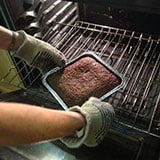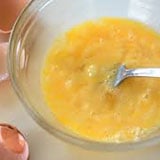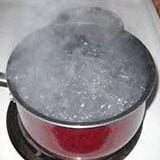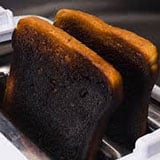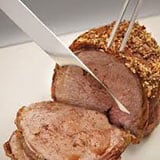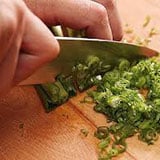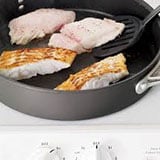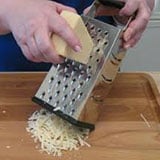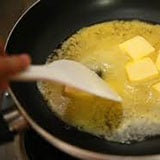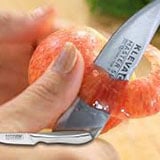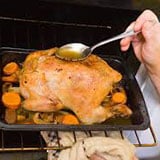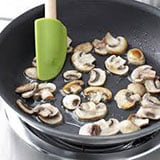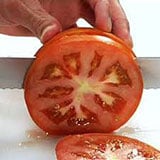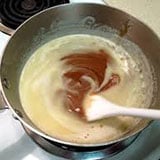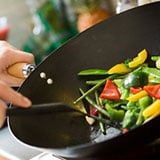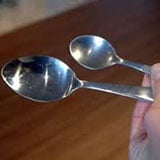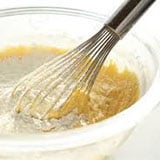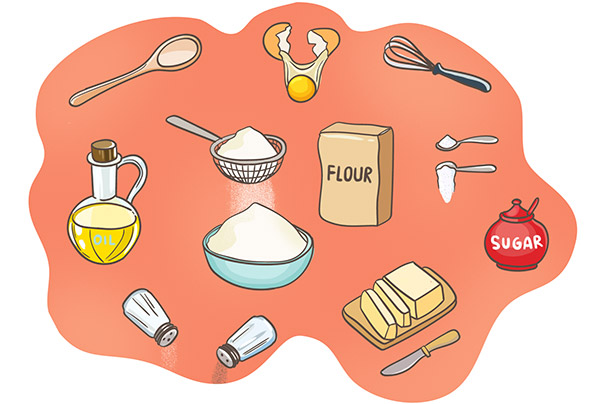with word definitions, example sentences and quiz

Knowing how to cook is a one of the most useful skills we can learn. If we can cook, we can eat healthy dishes made at home with fresh ingredients instead of having to buy unhealthy fast food or expensive pre-cooked or frozen meals. Cooking our own meals is not only healthy and cheap, but can also be fun if we explore cookbooks and cooking websites and find new recipes to try.
Frying, boiling and steaming
Even if you only have a small stove or cooker with a couple of hotplates, you can cook delicious food at home. You can fry meat, fish or eggs in a frying pan with oil or butter. You can also chop or slice vegetables and sauté or stir-fry them in a pan or a wok. Another way of cooking vegetables and grains like rice is by boiling or steaming them. You can peel vegetables like potatoes and carrots before cooking them, and even mash them after they’re cooked if you like. You can also boil other foods like spaghetti, eggs and certain meats, or steam fish and other seafood like crabs and mussels.
With a simple hotplate you can also make soups and stews. The ingredients for these often include diced meats and vegetables as well as a pinch of salt. You can also sprinkle in spices like pepper or paprika or add herbs like basil or parsley. You can even make sauces by melting butter in a saucepan and mixing in flour and milk before adding other ingredients like grated cheese and then stirring until your sauce is smooth.
Grilling and roasting
If you have a stove with a grill or broiler, or an appliance such as an electric grill, you can also grill meat, fish and vegetables. If you’re grilling food at a high temperature, be careful. It’s easy to burn it if you cook the food for too long. But many people love grilling, and some even say it’s the best way to cook fish, steak and many other meats.
If you also have an oven you can roast certain meats and vegetables. In an oven, food is surrounded by hot air that gradually cooks from all sides, so roasting a whole chicken or a leg of lamb takes time. After being cooked, roast meat is carved into pieces before being served, often together with roast potatoes, carrots and onions. A meal like this is sometimes called a «Sunday roast» as it was traditionally cooked every Sunday in countries like England and Australia.
Baking
Ovens can also be used to bake foods like bread, cakes, cookies, pastries and pies. The main ingredient of most baked foods is wheat flour. After being sifted to remove any lumps, the flour is used to prepare a batter or dough that’s put into a preheated oven to bake. People often think baking is difficult, but as the following recipe shows it can be easy if you have simple directions to follow.
Vanilla Cake
Ingredients
- 1 cup white sugar
- 1/2 cup butter
- 2 eggs
- 1 tbsp vanilla extract
- 1 1/2 cups self-raising flour
- 1/2 cup milk
Directions
- Preheat oven to 350 degrees F (175 degrees C). Grease and flour a cake pan.
- In a mixing bowl, cream together the sugar and butter. Beat in the eggs, then add a tablespoon of vanilla extract and whisk. Add flour to the mixture and stir in milk until the batter is smooth. Pour or spoon batter into the greased cake pan.
- Bake for 30 to 40 minutes in the preheated oven.
baking a cake
beating eggs
boiling water
burnt toast
carving meat
chopping green onions
cookbook
cutting a pepper
frying fish fillets
grating cheese
grilling
mashing potatoes
melting butter
mixing flour and eggs
peeling an apple
roasting a chicken
sautéing mushrooms
slicing a tomato
sprinkling salt
steaming broccoli
stirring a sauce
stir-frying vegetables
tablespoon and teaspoon
whisking a cake mix
add (verb): to put something else in — Add grated cheese to the white sauce and stir.
bake (verb): to cook in an oven — I can bake cakes and pies, but I can’t bake bread.
beat (verb): to mix eggs, cream, etc. with a fork, a beater, or a whisk — To make scrambled eggs, beat the eggs before cooking them.
boil (verb): to cook in boiling water — Will you boil the vegetables, or steam them?
burn (verb): to spoil food by cooking it for too long or at a temperature that’s too high — Please don’t burn the toast.
carve (verb): to cut slices or small pieces from a large piece of cooked meat — Who’d like to carve the roast chicken?
chop or chop up (verb): to cut into small pieces with a sharp knife — It’s easy to cut yourself when chopping onions, so be careful.
cook (verb): to prepare food for eating — What are you cooking for dinner?
cookbook or cookery book (noun): a book of recipes, often with pictures — Can I borrow that cookbook with all the Asian recipes?
dice (verb): to cut food into small cubes or squares — Dice the carrots and potatoes and add them to the soup.
dish (noun): food that’s cooked in a certain way — My favourite Indian dish is vegetable curry.
fry (verb): to cook food in hot oil, butter or fat — Heat some olive oil in a frying pan and then add the diced tomatoes.
grate (verb): to cut tiny slices from cheese, vegetables, chocolate, etc. with a grater — Grate half a cup of cheese and sprinkle it on top.
grease (verb): to rub butter or oil onto a baking pan or dish to stop food from sticking — Should I grease the cake tin with butter or oil?
grill (also US «broil») (verb): to cook directly over or under a very hot gas flame or electric element — Is the fish grilled under a gas grill or an electric grill?
herb (noun): a plant used for adding flavour to food — Good cooks always know which herbs to use.
ingredient (noun): any food, liquid, herb or spice that’s used to make a particular dish — Chilli and fish sauce are basic ingredients in many Thai dishes.
mash (verb): to crush food like cooked potato until it’s a smooth mass — Could you mash the potatoes, please?
melt (verb): to turn a solid substance into a liquid by heating — Melt some butter in a saucepan and then add the flour.
mix (verb): to combine two or more substances — The flour is mixed with a little oil and warm water to make a dough.
peel (verb): to take or cut the skin off a vegetable or fruit — I get juice all over my fingers if I peel an orange.
pinch (noun): a very small amount of something like salt or ground spice — Add a pinch of salt to the water before boiling vegetables.
preheat (verb): to turn on and heat an oven or grill before cooking — It’s important to preheat your oven before baking scones.
prepare (verb): to make food ready for cooking or eating — It takes an hour or more to prepare this dish.
recipe (noun): a list of ingredients and instructions for cooking a particular dish — My grandmother gave me this recipe for apple pie.
roast (verb): to cook foods like meat and vegetables in an oven — Why don’t we roast some vegetables as well?
sauté (verb): to fry quickly in hot oil or fat — To begin, sauté the onions and garlic in a saucepan.
serve (verb): to give someone food that’s been prepared or a drink — Make sure the food’s still hot when you serve it.
spice (noun): a plant part, often ground into a powder, that adds flavour to a dish — Which spices did you add to this sauce?
sprinkle (verb): to add a few drops of liquid or a substance like salt or pepper by shaking a container or by using your fingers — Why do you sprinkle so much salt on everything?
steam (verb): to cook in hot steam from boiling water — Steaming vegetables destroys fewer nutrients than boiling them.
stir (verb): to move a spoon or other implement around to mix something — If you don’t stir the sauce enough, it’ll be lumpy.
stir-fry (verb): to fry quickly over a high heat while stirring — Lots of people stir-fry all kinds of meat and vegetables these days.
tablespoon (abbrev: «tbsp») (noun): a large spoon used for serving, or the amount of an ingredient that fits in one — Add a tablespoon of flour to the melted butter and stir.
teaspoon (abbrev: «tsp») (noun): a small spoon or the amount of an ingredient that fits in one — You didn’t use more than half a teaspoon of chili powder, did you?
whisk (verb): to mix something very quickly with a whisk — Break the eggs into a bowl and whisk until smooth.
повар, кашевар, кок, кухарка, готовить, варить, вариться, поварской
существительное ↓
- повар; кухарка
- мор. кок
every cook praises his own broth — всякий повар свою стряпню хвалит; ≅ всяк кулик своё болото хвалит
too many cooks spoil the broth — семь поваров за жарким не уследят; ≅ у семи нянек дитя без глазу
he is a poor /an ill/ cook that cannot lick his own fingers — повар с голоду не умирает; ≅ повар в поварне, что волк в овчарне
глагол ↓
- готовить (пищу), стряпать; варить, жарить, печь и т. п.
- вариться, жариться, печься и т. п.
these apples don’t cook well — эти яблоки не годятся для варки или для печения
let the meat cook slowly — пусть мясо поварится /потушится/ на медленном огне
- работать поваром, кухаркой и т. п.
he cooked in lumber camps — он кашеварил у лесорубов
- подвергаться действию тепла, жариться
to be cooked alive in the tropics — изнемогать /страдать/ от тропической жары
- подделывать, фальсифицировать (тж. cook up)
to cook accounts [books] — подделать счета [бухгалтерские книги]
- выдумать, придумать
to cook a story — придумать рассказ (о происшествии и т. п.)
to cook an excuse — сочинить /придумать/ предлог
- разг. погубить, извести (кого-л.)
- амер. сл. гореть, пылать (энтузиазмом и т. п.)
- амер. сл. умереть на электрическом стуле
you’ll cook for that! — тебя за это поджарят!
- амер. сл. разводить наркотик водой (перед введением)
- отлично работать, показывать класс (особ. об исполнении музыки)
- проходить отлично, на ура (о вечере и т. п.)
- фото проф. передерживать
what’s cooking? — что происходит?, что готовится?
to cook one’s (own) goose /реже bacon/ — погубить себя; ≅ вырыть самому себе яму
to cook smb.’s goose — погубить кого-л.; расправиться с кем-л.
to cook a hare before catching him — ≅ делить шкуру неубитого медведя
Мои примеры
Словосочетания
busy people who don’t have time to cook — занятые люди, у которых нет времени готовить 
the most resourceful cook in town — самый изобретательный повар в городе 
to cook / prepare food — готовить еду 
to keep a cook — иметь повара 
to cook / fix / prepare a meal — готовить еду 
to cook meat — готовить мясо 
to cook beef — готовить блюдо из говядины 
to cook accounts — подделать счета 
to cook one’s (own) goose — погубить себя 
economical cook — бережливый повар 
cook book — поваренная книга 
cook on a slow fire — варить на медленном огне 
Примеры с переводом
She cooked a great meal. 
Она приготовила великолепную еду.
My husband doesn’t cook. 
Мой муж не готовит.
They helped to cook the meal. 
Они помогали готовить еду.
Where did you learn to cook? 
Где ты научился готовить?
Cook the milk over low heat. 
Нагрейте молоко на слабом огне.
I’m a hopeless cook. 
Я безнадёжен в готовке /кулинарии/.
Can your cook whip up a meal for us in half an hour? 
Твоя кухарка может приготовить нам какую-нибудь еду за полчаса?
ещё 23 примера свернуть
Примеры, ожидающие перевода
I promised I’d cook for them. 
He could smell something delicious cooking. 
The cook pummelled at the dough. 
Для того чтобы добавить вариант перевода, кликните по иконке ☰, напротив примера.
Возможные однокоренные слова
cooker — плита, печь, кастрюля, сорт фруктов, годный для варки, тот, кто подделывает
cooked — приготовленный, вареный, кипяченый
cooking — готовка, варка, варение, кухонный
overcook — пережарить
undercook — недоваривать, недовар
Формы слова
verb
I/you/we/they: cook
he/she/it: cooks
ing ф. (present participle): cooking
2-я ф. (past tense): cooked
3-я ф. (past participle): cooked
noun
ед. ч.(singular): cook
мн. ч.(plural): cooks
Пожалуй, самый аппетитный вордлист на нашем сайте – более 100 слов на тему Готовка Cooking на английском языке для тех, кто любит готовить, есть и учить английский!
Слова на английском на тему «Готовка» Cooking:
1. Tasty [ˈteɪsti ] – вкусный
2. Tin [tɪn ] – консервная банка
3. Crisp [krɪsp ] – хрустеть
4. Drink [drɪŋk ] – пить
5. Cook [kʊk ] – готовить, стряпать
6. Tasteless [ˈteɪstləs ] – безвкусный
7. Lunch [lʌnʧ ] – обед
8. Brew [bru ] – настаивать, заваривать
9. Junk food [ʤʌŋk fud] – еда от нечего делать, от безделья
10. Delicious [dɪˈlɪʃəs ] – изысканный, очень вкусный
11. Disgusting [dɪsˈgʌstɪŋ ] – отвратительный
12. Breakfast [ˈbrɛkfəst ] – завтрак
13. Carve [kɑrv ] – резать, вырезать
14. Fill with [fɪl wɪð] – наполнять чем-либо
15. Defrost [dɪˈfrɔst ] – размораживать
16. Juicy [ˈʤusi ] – сочный
17. Pulp [pʌlp ] – мякоть (плода)
18. Shelled [ʃɛld ] – чищенный
19. Husk [hʌsk ] – шелуха
20. Stuffed [stʌft ] – фаршированный
21. Fatty [ˈfæti ] – жирный
22. Course [kɔrs ] – блюдо
23. Stale [steɪl ] – черствый, несвежий
24. Spicy [ˈspaɪsi ] – пряный, ароматный
25. Roast [roʊst ] – жарить
26. Slice [slaɪs ] – ломтик, кусок
27. Fry [fraɪ ] – жарить
28. Swallow [ˈswɑloʊ ] – глотать
29. Stir [stɜr ] – помешивать, размешивать
30. Sour [ˈsaʊər ] – закисать, прокисать
31. Undercooked [əndərˈkʊkt ] – недоваренный
32. Portion [ˈpɔrʃən ] – порция
33. Creamy [ˈkrimi ] – сливочный
34. Baked [beɪkt ] – запеченный
35. Fried [fraɪd] – жареный, обжаренный
36. Steamed [stimd ] – приготовленный на пару
37. Taste [teɪst ] – вкус
38. Mixture [ˈmɪksʧər ] – смесь
39. Ingredient [ɪnˈgridiənt ] – ингредиент
40. Chunk [ʧʌŋk ] – кусок, ломоть
41. Hunger [ˈhʌŋgər] – голод
42. Grill [grɪl ] – гриль
43. Unripe [ʌnˈraɪp ] – неспелый
44. Dinner [ˈdɪnər ] – обед
45. Menu [ˈmɛnju ] – меню
46. Hungry [ˈhʌŋgri ] – голодный
47. Heat [hit ] – согревать, подогревать
48. Tender [ˈtɛndər ] – нежный, мягкий
49. Bake [beɪk ] – печь
50. Fresh [frɛʃ ] – свежий
51. Helping [ˈhɛlpɪŋ ] – порция
52. Savory [ˈseɪvəri ] – острый
53. Can [kæn ] – консервная банка
54. Diet [ˈdaɪət ] – диета
55. Serve [sɜrv ] – подавать (на стол), сервировать
56. Cured [kjʊrd ] – вяленый, засоленный
57. Firm [fɜrm ] – твердый, крепкий
58. Seedless [ˈsidləs ] – без косточек
59. Salted [ˈsɔltəd] – соленый
60. Pasteurized [ˈpæsʧəˌraɪzd ] – пастеризованный
61. Unsalted [ʌnˈsɔltəd] – пресный, несоленый
62. Salty [ˈsɔlti ] – соленый
63. Rotten [ˈrɑtən ] – прогнивший, испорченный
64. Lick [lɪk] – лизать
65. Supper [ˈsʌpər ] – ужин
66. Pickled [ˈpɪkəld ] – маринованный, соленый
67. Raw [rɑ ] – сырой, недоваренный
68. Eat [it] – есть
69. Steam [stim ] – готовить на пару
70. Starve [stɑrv ] – очень хотеть есть, голодать
71. Crunchy [ˈkrʌnʧi ] – хрустящий
72. Be full [bi fʊl] – быть сытым
73. Piece [pis ] – кусок, часть
74. Canned [kænd ] – консервированный
75. Scramble [ˈskræmbəl ] – взбалтывать
76. Grate [greɪt ] – натирать (на терке)
77. Skinned [skɪnd ] – без шкуры, очищенный
78. Frozen [ˈfroʊzən ] – замороженный
79. Rind [raɪnd ] – корка, кожура
80. Seasonal [ˈsizənəl ] – сезонный
81. Crushed [krʌʃt ] – дробленый, измельченный
82. Fat free [fæt fri] – обезжиренный
83. Crust [krʌst ] – корочка
84. Nasty [ˈnæsti ] – противный
85. Tough [tʌf ] – жесткий
86. Bland [blænd ] – умеренный
87. Stew [stu ] – тушить, варить
88. Recipe [ˈrɛsəpi ] – рецепт
89. Ripe [raɪp ] – спелый
90. Peel [pil ] – чистить, снимать кожуру
91. Broil [brɔɪl ] – жарить на огне
92. Main course [meɪn kɔrs] – основное блюдо
93. Cookbook [ˈkʊkˌbʊk ] – поваренная книга
94. Steam [stim ] – пар
95. Roll [roʊl ] – раскатывать (тесто)
96. Smoked [smoʊkt ] – копченый
97. Rasher [ˈræʃər ] – тонкий ломти
98. Boned [boʊnd ] – очищенный от костей
99. Roasted [ˈroʊstəd ] – жареный
100. Easy cook [ˈizi kʊk] – легкий в готовке
101. Knead [nid ] – месить, замешивать
102. Brine [braɪn ] – рассол
103. Marinated [ˈmɛrəˌneɪtɪd ] – маринованный
104. Dressed [drɛst ] – заправленный
105. Overcooked [ˌoʊvərˈkʊkt ] – переваренный
106. Leftovers [ˈlɛfˌtoʊvərz ] – остатки еды, объедки
107. Boil [bɔɪl ] – кипятить
108. Chew [ʧu ] – жевать
109. Bitter [ˈbɪtər ] – горчить
110. Hot [hɑt ] – острый
111. Side dish [saɪd dɪʃ ] – гарнир
112. Edible [ˈɛdəbəl ] – съедобный
113. Barbecue [ˈbɑrbɪˌkju ] – барбекю
114. Pour [pɔr ] – литься, наливать
115. Combine [ˈkɑmbaɪn] – объединить, смешать
116. Cooking [ˈkʊkɪŋ ] – готовка
117. Simmer [ˈsɪmər ] – закипать, кипеть на медленном огне
118. Desiccated [ˈdɛsəkeɪtəd ] – сушеный
119. Fragranced [ˈfreɪgrənst ] – ароматизированный
120. Ground [graʊnd ] – молотый
121. Sift [sɪft ] – просеивать
122. Glaze [gleɪz ] – глазировать
123. Decoration [ˌdɛkəˈreɪʃən ] – украшения
124. Chef [ʃɛf ] – повар
Подпишись, чтобы не пропустить свежие статьи!
Подписаться
Что может быть вкуснее ароматных бабушкиных пирогов с курочкой и грибами? Да ничего! Но рядом с героиней нашей статьи Еленой не оказалось свободной бабушки, желающей накормить ее этим божественно вкусным блюдом, так что пришлось справляться своими силами. В этой статье мы познакомим вас (и Елену) с кулинарными понятиями и кухонной утварью на английском языке, а также попробуем приготовить аппетитный пирог вместе с всемирно известным шеф-поваром и гуру кулинарии Джейми Оливером.
Содержание:
- 1. Английские меры веса
- 2. Названия кухонной утвари на английском языке
- 3. Виды кулинарной обработки продуктов на английском языке
- 4. Готовим с Джейми Оливером
Английские меры веса
Итак, Елена нашла в Интернете рецепт вкуснейшего пирога с курочкой и грибами от Джейми Оливера. Она уже обнаружила в недрах холодильника шампиньоны и положила размораживаться курицу подальше от нагло облизывающегося кота. И тут она поняла, что в рецепте указаны незнакомые ей меры веса — фунты, унции и т. д. «Что же делать?» — застыл в глазах беспомощной Елены немой вопрос. Мы дали ей три совета. Во-первых, не паниковать. Во-вторых, проследить за мясом, кажется, кот уже воплощает в жизнь коварный план по поеданию куриной грудки. В-третьих, воспользоваться нашей табличкой-помощником, чтобы разобраться, в каких количествах ей понадобится тот или иной продукт.
| Слово | Перевод |
|---|---|
| a coffee spoon | ½ чайной ложки, кофейная ложка |
| a cup | чашка (250 мл) |
| a dessertspoon | десертная ложка (10 г) |
| a fluid ounce | жидкая унция (примерно 30 мл) |
| a knob (of a butter) | небольшой кусочек (масла) |
| a tablespoon (tbs) | столовая ложка (15 г, в некоторых случаях 20 г) |
| a teaspoon | чайная ложка (5 г) |
| a dash | очень маленькое количество — капелька |
| a drop | капля (примерно 0,05 мл) |
| a gallon | галлон (британский — 4,55 л, американский — 3,79 л) |
| a gram | грамм |
| an ounce/oz | унция (28,35 грамм) |
| a pinch | щепотка |
| a pint | пинта (американская — 470 мл, британская — 570 мл) |
| a pound | фунт (454 грамма) |
| a quart | кварта (британская — 1,14 л, американская — 0,95 л) |
| a smidgen = a bit | чуть-чуть, толика, немного |
| a wine glass | особая мера жидких ингредиентов равная примерно ½-¼ чашки или 60-125 грамм |
Кажется, все не так сложно, не правда ли? Елена взвесила продукты и вновь с воодушевлением взялась читать рецепт. Оказалось, что не только унции смущают нашу смелую кулинарку, но еще и некоторые другие слова, которые, судя по контексту, обозначают названия кухонной утвари. К счастью, в этот раз Елена не растерялась и, сняв кота с ноутбука, открыла следующий пункт нашей статьи.
Названия кухонной утвари на английском языке
| Слово | Перевод |
|---|---|
| a blender | блендер |
| a bottle opener | штопор |
| a bread knife | хлебный нож |
| a cake pan/tin | форма для выпечки тортов |
| a can opener | консервный нож |
| a carving fork | вилка, используемая при нарезании мяса |
| a cleaver | мясницкий нож-топорик |
| a coffee grinder | кофемолка |
| a colander | дуршлаг |
| a cookie cutter | формочка для печенья |
| a cookie sheet / a baking tray | противень для выпечки |
| a cooling rack | охладительная решетка |
| a cutting board | разделочная доска |
| a double boiler | пароварка |
| a flan tin | форма для выпечки флана (открытого пирога с ягодами) |
| a food processor | кухонный комбайн |
| a frying pan | сковородка |
| a garlic press | пресс для чеснока |
| a grater | терка |
| a grill pan | сковорода-гриль |
| a kitchen knife | кухонный нож |
| a knife sharpener | точилка для ножей |
| a ladle | поварешка, половник |
| a lid | крышка |
| a masher | толкушка для картофеля |
| a measuring cup | мерная кружка |
| a measuring spoon | мерная ложка |
| a meat tenderizer | молоток для отбивания мяса |
| a mixer | миксер |
| a mixing bowl | миска для смешивания (теста и т. п.) |
| a mortar | ступка |
| a paring knife | нож для чистки овощей и фруктов |
| a pastry brush | кисточка для выпечки |
| a peeler | нож для очистки кожуры |
| a pestle | пестик (ступки) |
| a pie tin | форма для выпечки пирогов |
| a piping bag | кондитерский мешок |
| a pot | кастрюля, горшочек |
| a pressure cooker | скороварка |
| a ramekin | небольшая керамическая порционная формочка (для суфле, кокота или жульена) |
| a roaster | утятница, гусятница |
| a rolling pin | скалка |
| a saucepan | кастрюлька для приготовления соусов |
| a scoop | ложка для мороженого или совок для льда |
| a skewer | шампур, вертел |
| a slotted spoon | шумовка (ложка с прорезями) |
| a spatula / a food turner | лопатка (для переворачивания пищи) |
| a strainer | сито, сетка для процеживания |
| a whisk | венчик |
| a wok | вок (глубокая сковорода с выпуклым дном) |
| an apple corer | нож для удаления сердцевины яблока |
| an earthenware dish | глиняный горшочек для приготовления пищи |
| an egg beater | венчик или специальная машинка для взбивания яиц |
| an oven mitt / a pot holder | прихватка |
| scales | весы |
Ну что же, вы изучили названия обычных кухонных принадлежностей, однако время не стоит на месте: нам доступны десятки кухонных гаджетов, призванных облегчить жизнь хозяйке (или хозяину). Давайте посмотрим, как работают некоторые из них, в следующем видео.
Виды кулинарной обработки продуктов на английском языке
Елена подготовила необходимые ей предметы и, уже по привычке отобрав у кота курицу, принялась дальше разбирать рецепт. Даже в русском языке Елену пугало загадочное слово «бланшировать», а уж английские to chop, to fry, to simmer и вовсе вселили в нее благоговейный страх перед кулинарией. Но девушка прекрасно понимает, что английский язык ей не родной, поэтому нет ничего плохого в том, чтобы еще раз воспользоваться словариком. Заварив себе чашечку кофе, Елена приступила к изучению следующего списка слов.
| Слово | Перевод |
|---|---|
| to add | добавить |
| to bake | запекать в духовке |
| to beat | взбивать и смешивать (например, яйца), обычно довольно интенсивно |
| to blanch | бланшировать (погружать ненадолго в очень горячую воду, обычно для снятия шкурки) |
| to blend | смешивать, обычно менее интенсивно, чем to beat |
| to boil | варить в кипящей воде |
| to braise | тушить в небольшом количестве жидкости, предварительно быстро обжарив в масле |
| to brew | заваривать чай/кофе, варить пиво |
| to broil / to grill / to barbecue | жарить на открытом огне |
| to brown | подрумянивать / обжаривать до румяной корочки |
| to carve | нарезать, разделать (приготовленное мясо) |
| to chop | измельчать, шинковать, порубить |
| to combine | смешивать, соединять |
| to cube / to dice | нарезать кубиками |
| to cut out | вырезать |
| to deep-fry | жарить во фритюре |
| to drain | сливать жидкость (обычно с помощью дуршлага) |
| to drizzle | сбрызнуть |
| to flatten | раскатать, выровнять (тесто скалкой) |
| to fold (something) in/into something | осторожно добавлять что-то (обычно в тесто), буквально по ложке |
| to form | сформировать |
| to fry | жарить |
| to grate | натереть |
| to knead | месить, замешивать (тесто) |
| to marinate | мариновать |
| to mash | разминать, пюрировать |
| to mince | пропустить через мясорубку |
| to mix | смешивать, обычно при помощи миксера |
| to pan-fry / to shallow-fry | жарить на сковороде в небольшом количестве масла |
| to peel | очистить от кожуры |
| to pour | наливать |
| to pureé | пюрировать, протирать через сито до состояния пюре |
| to roast | жарить в духовке или на открытом огне |
| to rub | натирать (например, мясо специями) |
| to sauté | быстро обжарить в небольшом количестве масла |
| to scald | обдать кипятком |
| to sear | обжарить мясо на большом огне, чтобы сохранить сок внутри |
| to separate eggs / to separate yolks from the whites | отделить желтки от белков |
| to simmer | кипятить на медленном огне, медленно кипеть |
| to slice | нарезать ломтиками |
| to spread | покрыть тонким слоем (масла, паштета, крема), намазать |
| to sprinkle | сбрызнуть, посыпать (сахарной пудрой, кунжутом) |
| to squeeze | выдавить (сок) |
| to steep | замочить |
| to stew | тушить |
| to stir | мешать (ложкой) |
| to stir-fry | жарить на большом огне, постоянно помешивая |
| to stuff | фаршировать |
| to toast | подрумянить на огне |
| to toss | добавить жидкость (соус/уксус/майонез) в пищу, чтобы полностью покрыть ею пищу (например, заправить салат или влить соус в пасту) |
| to whip | взбить так, чтобы сделать более воздушным (белки, крем) |
| to whip up | приготовить что-то на скорую руку |
| to whisk | взбивать (обычно белки) при помощи a whisk (венчик) |
Как видите, в табличке встречаются похожие слова, поэтому мы хотим дать некоторые пояснения, чтобы ваш кулинарный эксперимент получился точным и успешным.
Чем отличаются to roast и to fry? To fry означает, что вы обжариваете что-то в масле, обычно на сковородке, to roast значит, что вы жарите что-то в духовке (или на открытом огне) до румяной корочки.
В чем разница между to braise и to stew? Глагол to braise используется, когда вы тушите мясо или овощи и они лишь частично покрыты жидкостью. Если жидкость полностью покрывает продукты, в рецептах будет использоваться глагол to stew.
В рецептах вы можете встретить слово marinade, которое могут использовать и в качестве глагола «мариновать», и как существительное «маринад». Однако это неправильно: слово marinade может быть только существительным «маринад», а глагол «мариновать» — это to marinate.
А теперь разберемся в разнице между to mash и to pureé. Это похожие виды обработки пищи, однако когда вы to mash (разминаете) что-то, пища получается более сухой, как, например, картофельное пюре. Если же вы to pureé (пюрируете, протираете) что-то, пища получается жидкой консистенции, более похожей на воду, например, вы можете протереть смородину через сито и получите жидкое ягодное пюре.
Готовим с Джейми Оливером
Благодаря знанию английского языка Елена разобралась в рецепте и приготовила вкуснейший сочный пирог всего за 30 минут. От сногсшибательного аромата запеченной курочки с луком и грибами даже слегка обиженный кот пришел в восторг. Не знаем как у вас, а у нас уже разыгрался аппетит и появилось желание приготовить такое же чудо кулинарии. Если вы решили примкнуть к нашим рядам любителей пирогов, давайте посмотрим видео, в котором Джейми Оливер готовит эту чудесную пищу.
А теперь пришло время проверить, насколько хорошо вы запомнили термины из нашей статьи. Пройдите наш кулинарный тест.
Тест на знание терминов по теме «Словарь кулинара: как читать рецепты на английском языке»
Надеемся, от нашей статьи у вас разыгрался аппетит не только на пироги, но и изучение английского языка. Как вы догадались, любители приготовить что-нибудь вкусненькое могут совмещать свое хобби с изучением новых слов. Согласитесь, таким способом получать знания намного приятнее. Желаем вам приятного аппетита и успешного изучения английского языка!
Мы составили для вас документ, в котором собраны все слова по данной теме. Вы можете скачать его по ссылке ниже.
Скачать список слов по теме «Словарь кулинара: как читать рецепты на английском языке» (*.pdf, 309 Кб)
© 2023 englex.ru, копирование материалов возможно только при указании прямой активной ссылки на первоисточник.
👇 GET YOUR PDF BELOW 👇
In this lesson I will show you how to cook a basic soup in English!
Not only that, I will give you the recipe to the tasty soup.
In addition, I will give you 50 essential cooking words related to cooking and the kitchen.
Finally, you can get some great idioms too related to food vocabulary.
Table of Contents
Recipe
Carrot, leek and bean soup
- 1 Onion – (chopped)
- 2 Small potatoes – (cut into small chunks)
- 3 Carrots – (diced)
- 1 Leek – (sliced)
- 1 Can of broad beans
- 1 Pint of water
- Knob of butter, olive oil
- Salt, pepper and paprika to taste
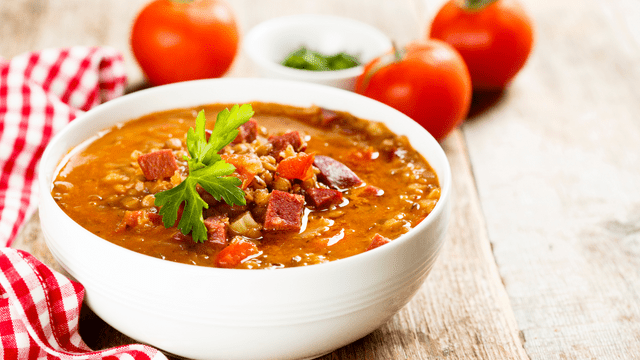
Method
- Prepare the onion and leek, then fry in a frying pan, or a pot on a low heat for 2 minutes.
- Keep stirring and add salt, pepper and paprika.
- Put the onion, leek and carrots in a pan with a drop of water, put the top on and steam for 2 minutes.
- Shake the pan from time to time, so the ingredients don’t stick.
- Take the lid off and add a pint of water, the beans (drained with a sieve) and the potatoes.
- Add a knob of butter.
- Put the lid on and bring to the boil.
- When boiling, lower the heat and simmer for 15-20 minutes.
- Taste and add more salt, pepper or a dash of vinegar if needed.
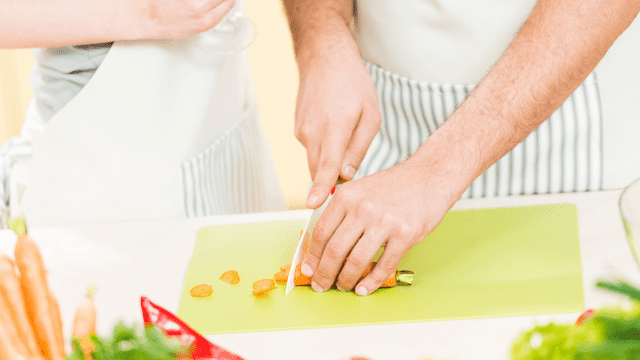
Cooking Vocabulary
Prep = Preparation
- An apron
- An electric hob
- A pot (pots and pans)
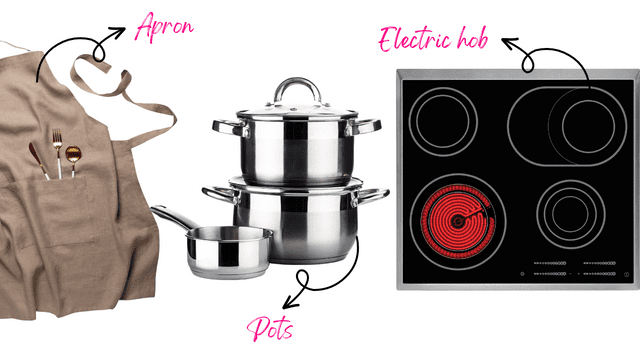
- A frying pan
- A chopping board
- A sieve /sɪv/
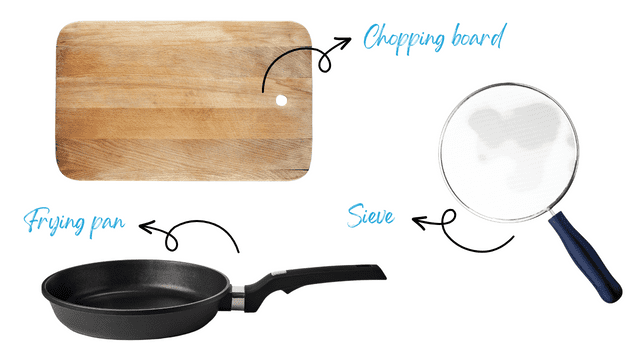
Utensils and Ingredients
(Cooking) utensils = tools for cooking
- A chopping knife
- A cleaver
- A paring knife
- A peeler
- A spatula / A turner
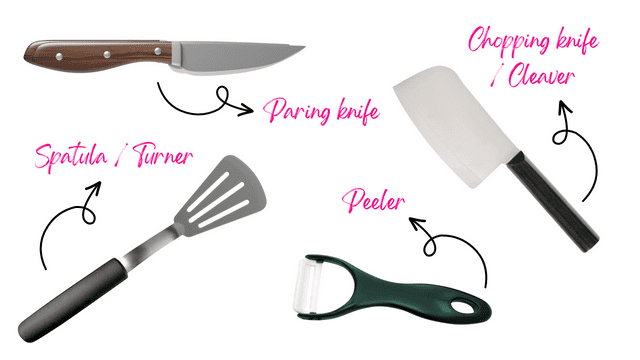
The 4 Essentials of Cooking
In her amazing book, Salt Fat Acid Heat, Samin Nosrat explains how these 4 things are essential to any dish, and how they work
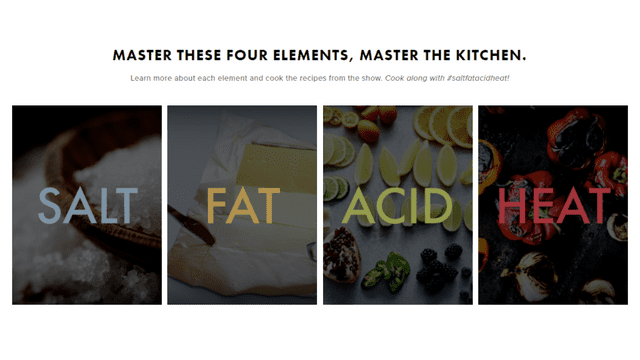
Preparation Techniques
- To chop = to cut into pieces with a knife
- To dice = to make into small cubes
- To slice = to cut into slices
Cooking Styles (verbs)
- To fry = to cook with oil in a frying pan
- To shallow fry = to cook with a little oil in a frying pan
- To deep fry = to cook with a lot of oil in a frying pan
- To sauté = to shallow fry
- To steam = to cook with steam
- To boil = to heat to 100℃
- To boil water / beans / soup
- To simmer = to boil gently
Cooking Actions
- To turn up / down the heat
- To turn on / off the hob
- To turn on / off the air vent
There are several ways to say ‘add’ ingredients
- To add
- To toss in
- To throw in
- To turn up / down the heat
- To stir (around) = to move the ingredients around in a pot, pan or dish
- To ladle out = to serve with a ladle To serve out / up
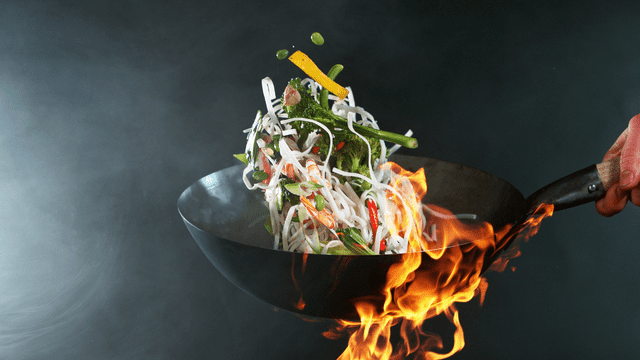
Quantities
- A pinch of salt
- A teaspoon of salt
- A dash of vinegar / water/ oil (a little)
- A knob of butter
Idioms and Phrasal Verbs
- To come along nicely = to make good progress
My soup is coming along nicely!
- To run out of something = to have none left
I have run out of oil, I need to buy some more
- To be partial to = to like
I am partial to carrots
- To give it a bit of a kick = to give it a strong spicy taste
- To play it by ear = to improvise, do something without a plan
- To wing it = to improvise, do something without a plan
- To take it with a pinch of salt = Don’t take it too seriously
- To shape up = to progress, to develop
Let me show you how this dish is shaping up
- Bob’s your uncle = That’s it! There you have it!
- To butter someone up = to praise someone so you can get their help
I tried to butter up my teacher so he would give me a good grade, but it didn’t work.
- To give someone the chop (informal) = to fire someone
Last week my uncle was given the chop, and now he is looking for a new job
- The best thing since sliced bread = the best thing ever
This new peeler is amazing. It’s the best thing since sliced bread!
- To roll the dice = to take a chance
Why don’t you try starting up your own business. Just roll the dice and see what happens!
If you have any more questions or suggestions, please leave me a comment below.

Find Your Confidence!
Check out my online courses so you can…
- Build your confidence
- Speak more fluently
- Succeed in IELTS Speaking

Cooking is the process of preparing food by mixing the ingredients and heating for consumption. There are many cooking methods such as baking, grilling, or boiling. The person who prepares food is called cook. Cooking is mostly done in the kitchens with special tools and equipments. These are called kitchen utensils.
Table of Contents
- ⬤ Pictures of cooking vocabulary with pronunciations
- ⬤ Word list of cooking vocabulary in English
- ⬤ Flashcards exercise about cooking vocabulary
- ⬤ Flip the card game about cooking
- ⬤ Images of cooking vocabulary to download and share
- ⬤ Picture quiz about cooking
- ⬤ Listening test about cooking
- ⬤ Writing test about cooking
- ⬤ Spelling test about cooking vocabulary
- ⬤ Worksheets for cooking vocabulary to download
⬤ Pictures of cooking vocabulary with pronunciations
Here is a list of cooking vocabulary in English with pictures and pronunciation. Click on an image for the pronunciation.
The browser you are using does not support HTML5 audio playback. Sorry.
⬤ Word list of cooking vocabulary in English
-
Verbs about cooking
- add
- bake
- blend
- boil
- broil
- chop
- cut
- dip
- fry
- grate
- melt
- mix
- scramble
- serve
- pour
- roast
- simmer
- slice
- spread
- stir
- taste
- squeeze
- peel
- strain
- drain
-
Cooking utensils vocabulary
- can opener
- microwave
- mixing bowl
- paper towels
- roast
- rolling pin
- knife
- spoon
- spatula
- steam
- fork
- ladle
- frying pan
- sink
- dish
- pan
- scale
- oven
- cutting board
- plate
- tray
- refrigerator
- dishwasher
SIMILAR PAGES:
❯❯ Foods vocabulary
❯❯ Fruits vocabulary
❯❯ Vegetables vocabulary
❯❯ Drinks vocabulary
❯❯ Fast food vocabulary
❯❯ Herbs and spices vocabulary
⬤ Flashcards exercise about cooking vocabulary
Below is a flashcards exercise about cooking. The flashcards have images of cooking. Try to guess the name of an image and click on it to see the answer.
⬤ Flip the card game about cooking
Click on a card to open it and then you will see a word about cooking. Say the meaning of it in your own language.
⬤ Picture quiz about cooking
Below is a picture quiz about cooking. Select the best option according to the picture of cooking. For every correct answer you get 10 points.
⬤ Listening test about cooking
This is a listening test practice about cooking. First listen to the audio about cooking. Then select the corresponding picture from the list.
⬤ Writing test about cooking
Here is a writing test about cooking. Look at the picture and type the name of the image correctly into the text box.
⬤ Spelling test about cooking vocabulary
You will see a listening and spelling test about cooking below. First start the test and listen to the audio. Then type what you hear in the text box.
⬤ Worksheets for cooking vocabulary to download
Work in progress!
Useful words to be able to cook and talk about cooking and eating in general.
215 words
547 learners
Learn words with Flashcards and other activities
Other learning activities
Full list of words from this list:
-
stir fry
fry very quickly over high heat
-
boil
change from a liquid to vapor
-
caramelise
convert to caramel
-
frying
cooking in fat or oil in a pan or griddle
-
bake
cook and make edible by putting in a hot oven
-
cook
transform by heating
-
carbohydrate
an essential component of living cells and source of energy
-
protein
an organic compound essential to living cells
-
fat
a soft greasy substance occurring in organic tissue
-
butter
a solid yellow food made from cream
-
ghee
clarified butter used in Indian cookery
-
tamarind
long-lived tropical evergreen tree with a spreading crown and feathery evergreen foliage and fragrant flowers yielding hard yellowish wood and long pods with edible chocolate-colored acidic pulp
-
Curcuma
tropical Asiatic perennial herbs
-
ginger
plant with thick aromatic rhizomes and leafy reedlike stems
-
garlic
bulbous herb of southern Europe widely naturalized
-
honey
a sweet yellow liquid produced by bees
-
soja
erect bushy hairy annual herb having trifoliate leaves and purple to pink flowers; extensively cultivated for food and forage and soil improvement but especially for its nutritious oil-rich seeds; native to Asia
-
oil
a slippery or viscous liquid or liquefiable substance not miscible with water
-
corn
tall annual cereal grass bearing kernels on large ears: widely cultivated in America in many varieties; the principal cereal in Mexico and Central and South America since pre-Columbian times
-
soup
liquid food especially of meat or fish or vegetable stock often containing pieces of solid food
-
dish
a piece of dishware normally used as a container for holding or serving food
-
grill
a framework of metal bars used as a partition or a grate
-
sweeten
make sweeter in taste
-
tasting
a kind of sensing
-
vinegar
a sour-tasting liquid used as a condiment or preservative
-
cup
a small open container usually used for drinking
-
tablespoon
a spoon larger than a dessert spoon; used for serving
-
teaspoon
a small spoon used for stirring tea or coffee
-
herb
a plant lacking a permanent woody stem
-
pork
meat from a domestic hog or pig
-
noodle
a ribbonlike strip of pasta
-
rice
annual or perennial rhizomatous marsh grasses
-
potato
an edible tuber native to South America
-
tomato
mildly acid red or yellow pulpy fruit eaten as a vegetable
-
pastry
any of various baked foods made of dough or batter
-
cake
baked good based on a mixture of flour, sugar, eggs, and fat
-
cherry
any of numerous trees and shrubs producing a small fleshy round fruit with a single hard stone; many also produce a valuable hardwood
-
almond
small bushy deciduous tree native to Asia and North Africa
-
cinnamon
tropical Asian tree with aromatic yellowish-brown bark
-
beef
meat from an adult domestic bovine
-
chicken
a domestic fowl bred for flesh or eggs
-
turkey
large gallinaceous bird with fan-shaped tail
-
fish
any of various mostly cold-blooded aquatic vertebrates
-
salmon
any of various large food and game fishes of northern waters
-
onion
bulbous plant having hollow leaves cultivated worldwide for its rounded edible bulb
-
pie
dish baked in pastry-lined pan often with a pastry top
-
pudding
any of various soft sweet desserts thickened usually with flour and baked or boiled or steamed
-
scampi
large shrimp sauteed in oil or butter and garlic
-
nut
usually large hard-shelled seed
-
crumble
break or fall apart into fragments
-
thyme
any of various mints of the genus Thymus
-
lemon
yellow oval fruit with juicy acidic flesh
-
lime
the green acidic fruit of any of various lime trees
-
roast
cook with dry heat, usually in an oven
-
gravy
a sauce made by adding stock, flour, or other ingredients to the juice and fat that drips from cooking meats
-
kidney
either of two bean-shaped excretory organs that filter wastes (especially urea) from the blood and excrete them and water in urine
-
bean
a leguminous plant grown for its edible seeds and pods
-
spice
any of a variety of pungent aromatic vegetable substances used for flavoring food
-
biscuit
small round bread leavened with baking-powder or soda
-
melt
reduce or cause to be reduced from a solid to a liquid state
-
caster sugar
very finely granulated sugar that was formerly sprinkled from a castor
-
egg
animal reproductive body consisting of an ovum or embryo together with nutritive and protective envelopes; especially the thin-shelled reproductive body laid by e.g. female birds
-
yolk
material of an egg stored for the nutrition of an embryo
-
condensed milk
sweetened evaporated milk
-
icing sugar
finely powdered sugar used to make icing
-
double cream
fresh soft French cheese containing at least 60% fat
-
ingredient
a component of a mixture or compound
-
orange zest
tiny bits of orange peel
-
whip
an instrument with a handle and a flexible lash
-
dollop
a soft lump or portion of something, especially food
-
scatter
cause to separate and go in different directions
-
serve
devote one’s life or efforts to, as of countries or ideas
-
whisk
a mixer incorporating a coil of wires
-
bowl
a round vessel that is open at the top
-
juice
the liquid part that can be extracted from plant or animal tissue by squeezing or cooking
-
pour
cause to run
-
bash
hit hard
-
baking soda
a white soluble compound (NaHCO3) used in effervescent drinks and in baking powders and as an antacid
-
trim
make a reduction in
-
sunflower
any plant of the genus Helianthus having large flower heads with dark disk florets and showy yellow rays
-
Cumberland
English general
-
bacon
back and sides of a hog salted and dried or smoked
-
chop
cut with a hacking tool
-
cannelloni
tubular pasta filled with meat or cheese
-
haricot
a French variety of green bean plant bearing light-colored beans
-
drained
emptied or exhausted of
-
carrot
perennial plant widely cultivated as an annual in many varieties for its long conical orange edible roots; temperate and tropical regions
-
slice
a thin flat piece cut off of some object
-
breadcrumb
crumb of bread; used especially for coating or thickening
-
pan-fry
fry in a pan
-
spoonful
as much as a spoon will hold
-
braising
cooking slowly in fat in a closed pot with little moisture
-
stove
a kitchen appliance used for cooking food
-
simmer
boil slowly at low temperature
-
tender
easy to cut or chew
-
moistening
the act of making something slightly wet
-
baking tray
a cooking utensil consisting of a flat rectangular metal sheet used for baking cookies or biscuits
-
prawn
shrimp-like crustacean often used as food
-
pasta
shaped and dried dough made from flour and water and sometimes egg
-
shell
the outer covering of an animal
-
pea
a leguminous plant of the genus Pisum with small white flowers and long green pods containing edible green seeds
-
lamb
young sheep
-
pancake
a flat cake of thin batter fried on both sides on a griddle
-
braise
slowly cook in fat and some liquid
-
stew
cook slowly and for a long time in liquid
-
gnocchi
small Italian dumplings made of potato or flour
-
pumpkin
a coarse vine widely cultivated for its large pulpy round orange fruit with firm orange skin and numerous seeds; subspecies of Cucurbita pepo include the summer squashes and a few autumn squashes
-
mug
with handle and usually cylindrical
-
pan
shallow container made of metal
-
spud
an edible tuber native to South America
-
artichoke
a plant cultivated for its large, edible flower head
-
butternut squash
plant bearing buff-colored squash having somewhat bottle-shaped fruit with fine-textured edible flesh and a smooth thin rind
-
pickle
vegetables preserved in brine or vinegar
-
rocket salad
erect European annual often grown as a salad crop to be harvested when young and tender
-
parfait
sweet dish made of layered ice cream or yogurt, fruit, etc.
-
allspice
aromatic West Indian tree that produces berries
-
anise
a herb cultivated widely for its aromatic seeds and oil
-
anisette
liquorice-flavored usually colorless sweet liqueur made from aniseed
-
cinnamon
tropical Asian tree with aromatic yellowish-brown bark
-
clove
moderate sized very symmetrical red-flowered evergreen widely cultivated in the tropics for its flower buds which are source of cloves
-
oregano
aromatic Eurasian perennial
-
pepper
climber having dark red berries when fully ripe
-
salt
white crystalline form of especially sodium chloride used to season and preserve food
-
turmeric
widely cultivated tropical plant of India having yellow flowers and a large aromatic deep yellow rhizome; source of a condiment and a yellow dye
-
vanilla
any of numerous climbing plants having fleshy leaves
-
nutmeg
East Indian tree widely cultivated in the tropics for its aromatic seed; source of two spices: nutmeg and mace
-
woad
any of several herbs of the genus Isatis
-
penne
pasta in short tubes with diagonally cut ends
-
alimentary paste
shaped and dried dough made from flour and water and sometimes egg
-
pasta
shaped and dried dough made from flour and water and sometimes egg
-
ziti
medium-sized tubular pasta in short pieces
-
orzo
pasta shaped like pearls of barley
-
zucchini
marrow squash plant whose fruit are eaten when small
-
pan-fry
fry in a pan
-
deep-fry
cook by immersing in fat
-
fish cake
a fried ball or patty of flaked fish and mashed potatoes
-
skipjack tuna
oceanic schooling tuna of considerable value in Pacific but less in Atlantic; reaches 75 pounds; very similar to if not the same as oceanic bonito
-
soy sauce
thin sauce made of fermented soy beans
-
sea squirt
ascidian that can contract its body and eject streams of water
-
soman
a nerve agent easily absorbed into the body
-
noodle
a ribbonlike strip of pasta
-
cuisine
the manner of preparing food or the food so prepared
-
sushi
cold rice and vinegar topped or rolled with raw fish
-
teriyaki
beef or chicken or seafood marinated in spicy soy sauce and grilled or broiled
-
tempura
vegetables and seafood dipped in batter and deep-fried
-
miso
a fermented soybean paste used in Japanese food
-
wheat gluten
gluten prepared from wheat
-
sea bream
any of numerous marine percoid fishes especially (but not exclusively) of the family Sparidae
-
pine nut
edible seed of any of several nut pines especially some pinons of southwestern North America
-
deep-fried
cooked by frying in fat
-
side dish
a dish that is served with, but is subordinate to, a main course
-
slurp
eat or drink noisily
-
sea urchin
shallow-water echinoderms having soft bodies enclosed in thin spiny globular shells
-
soy
the most highly proteinaceous vegetable known
-
fresh foods
food that is not preserved by canning or dehydration or freezing or smoking
-
daikon
radish of Japan with a long hard durable root eaten raw or cooked
-
abalone
a large edible marine gastropod with an ear-shaped shell
-
sesame oil
oil obtained from sesame seeds
-
eating place
a building where people go to eat
-
ingredient
a component of a mixture or compound
-
dine out
eat at a restaurant or at somebody else’s home
-
utensil
an implement for practical use
-
food court
an area where fast food is sold
-
seafood
edible fish or shellfish or roe etc
-
tofu
a soft, white, cheeselike food made from soybeans
-
white rice
having husk or outer brown layers removed
-
jujube
spiny tree having dark red edible fruits
-
giblet
edible viscera of a fowl
-
grilled
cooked over an outdoor grill
-
localize
concentrate on a particular place or spot
-
prawn
shrimp-like crustacean often used as food
-
flavoring
something added to food primarily for the savor it imparts
-
processed
subjected to a special treatment
-
domesticate
make fit for cultivation and service to humans
-
convenience store
a store selling a limited variety of food and pharmaceutical items; open long hours for the convenience of customers
-
giblets
edible viscera of a fowl
-
shellfish
aquatic invertebrate, often with a shell
-
distill
undergo condensation
-
seasoning
something added to food primarily for the savor it imparts
-
flavor
the taste experience when a savory condiment is taken into the mouth
-
in the raw
(used informally) completely unclothed
-
simmer
boil slowly at low temperature
-
etiquette
rules governing socially acceptable behavior
-
steamed
cooked in steam
-
low-budget
made on or suited to a limited budget
-
commoner
a person who holds no title
-
cutlet
thin slice of meat usually fried or broiled
-
sticky
having the sticky properties of an adhesive
-
topping
a flavorful addition on top of a dish
-
soybean
the most highly proteinaceous vegetable known
-
green tea
tea leaves that have been steamed and dried without fermenting
-
persimmon
any of several tropical trees of the genus Diospyros
-
condiment
a preparation to enhance flavor or enjoyment
-
communal
for or by a group rather than individuals
-
fermentation
breaking down an organic substance, as sugar into alcohol
-
bream
any of numerous marine percoid fishes especially (but not exclusively) of the family Sparidae
-
chef
a professional cook
-
dumpling
small balls or strips of boiled or steamed dough
-
broth
liquid in which meat and vegetables are simmered
-
gluten
a protein in wheat and other grains that makes dough elastic
-
pheasant
large long-tailed gallinaceous bird native to the Old World but introduced elsewhere
-
seaweed
plant growing in the sea, especially marine algae
-
nutritional
of or relating to or providing nutrition
-
apricot
downy yellow to rosy-colored fruit resembling a small peach
-
vinegar
a sour-tasting liquid used as a condiment or preservative
-
buckwheat
a member of the genus Fagopyrum
-
artichoke
a plant cultivated for its large, edible flower head
-
broccoli
plant with dense clusters of tight green flower buds
-
carrot
perennial plant widely cultivated as an annual in many varieties for its long conical orange edible roots; temperate and tropical regions
-
celery
widely cultivated herb with aromatic leaf stalks that are eaten raw or cooked
-
leek
plant having a large slender white bulb and flat overlapping dark green leaves; used in cooking; believed derived from the wild Allium ampeloprasum
-
scallion
a young onion before the bulb has enlarged; eaten in salads
-
asparagus
plant with long green stems that is eaten as a vegetable
-
arugula
European plant often grown for its pungent, edible leaves
-
rutabaga
a cruciferous plant with a thick bulbous edible yellow root
Created on October 29, 2013
(updated October 29, 2013)

